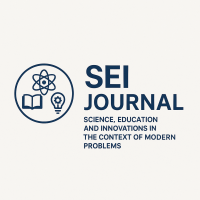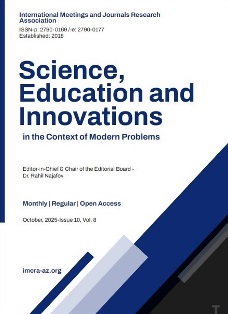-
Home Page
Science, Education and Innovations in the Context of Modern Problems (SEI)
Abbreviated Title: Sci. Educ. Innov. Context Mod. Probl. (Cover Main page; Cover Titul pages)
Science, Education and Innovations in the Context of Modern Problems (SEI) is an international, peer-reviewed academic journal dedicated to advancing academic excellence, research integrity, and global scholarly dialogue. The journal publishes original, high-quality, and interdisciplinary research across science, education, technology, and innovation, with particular emphasis on the practical application of scientific and technological advancements—such as energy systems, automation, artificial intelligence, and robotics—within educational and societal contexts. Its scope extends across the social sciences, pedagogical sciences, and technical disciplines, fostering integration between scientific progress, educational development, and innovative practices to address contemporary regional and global challenges. By prioritizing studies that highlight novel approaches and evidence-based solutions, SEI aims to promote knowledge dissemination and sustainable societal progress through the convergence of science, technology, and education.
The journal upholds rigorous academic and ethical standards through a double-blind peer review system, ensuring objectivity, fairness, and scientific merit in all published work.
Multidisciplinary Statement for SEI Journal
Science, Education and Innovations in the Context of Modern Problems (SEI) is a multidisciplinary, peer-reviewed journal that publishes research integrating science, education, technology, and innovation. It welcomes interdisciplinary studies that bridge the natural, social, and technical sciences to address contemporary global and regional challenges.ISSN (Print): 2790-0169; ISSN (Online): 2790-0177

DOI Prefix: 10.56334/sei
Year Established: 2018, Azerbaijan
Publisher: IMCRA – International Meetings and Conferences Research Association
Contact: editor@imcra-az.org | info@imcrapublishing.com
Language: English (partially French)
Frequency: Monthly (12 issues per year)
Peer Review: Double-blind and Open AccessJournal Statistics
Manuscript Submissions Received (per year): 240–300
Rejection Rate: ~75%
Acceptance Rate: 20–25%
Editorial and Review Timeline
Time to First Decision: 2–4 weeks (average 15–35 days depending on manuscript type)
Peer Review Duration: 20–45 days
Submission to Acceptance: ~55 days (average 35–55 days)
Acceptance to Publication: 60–160 days (extended even to –200 days in cases requiring substantial revisions)
Overall Time to Publication (from submission): ~55 days (standard cases)
Maximum Time for Major Revisions (exceptional cases): up to 145 daysScope of the Journal
Education & Pedagogy: Educational sciences, curriculum studies, economics of education
Science & Technology: Innovation, applied sciences, robotics, artificial intelligence
Social Sciences: Sociology, psychology, social work, demography
Law & Media: Law, communications, media studies, library and information science
Economics & Management: Finance, business, banking, marketing, management
Geography & Environment: Urban and regional planning, environmental studies
Interdisciplinary Studies: Linguistics, Language and Literature; regional development, cross-sectoral research
Mission and Vision
The mission of SEI is to provide an inclusive and scholarly platform that advances interdisciplinary research, promotes open access, and fosters global academic exchange. The journal supports innovative approaches to pressing societal challenges and facilitates knowledge transfer across scientific and professional domains.
Its vision rests on the belief that science and education are inseparable, a principle reflected in the journal’s title and editorial philosophy.
Submit Online
You can send your work directly to our editorial team using the online submission form.
This is our preferred method and will ensure the quickest response.
By Email
Authors may also submit a synopsis and complete manuscript via email to:
📧 info@imcrapublishing.com
Manuscript Guidelines
When submitting your work, please include the following:
-
A synopsis and the complete manuscript
-
Word count (of complete manuscript)
-
Genre and target audience
-
Author’s full name and contact details (in cover letter)
-
Relevant information about the author (biography, affiliations, etc.)
📑 Please send all materials for review as a single Word document and PDF file. TEMPLATE.doc
Journal Policies
The Science, Education and Innovations in the Context of Modern Problems (SEI) journal is committed to transparency, integrity, and best practices in scholarly publishing. To uphold these principles, SEI provides clear policies that outline the responsibilities of authors, reviewers, editors, and the publisher. These policies ensure a smooth, ethical, and high-quality publication process in line with international standards.
Readers, authors, and reviewers are encouraged to consult the following subsections for comprehensive details:
1. Authorship
SEI requires that all listed authors meet established criteria for authorship, including substantial contributions to conception, design, execution, or interpretation of the study. Authors must approve the final version before submission.
2. Authors’ Warranties
By submitting a manuscript, authors warrant that their work is original, has not been published elsewhere, and is not under consideration by another journal. They also confirm that all necessary permissions have been obtained.
3. Peer Review
SEI operates a rigorous, double-blind peer review system to ensure fairness, quality, and impartiality. All manuscripts are reviewed by at least two independent experts in the relevant field.
4. Author Appeals
Authors have the right to appeal editorial decisions by providing a detailed justification. Appeals are reviewed by the Editor-in-Chief and, if necessary, independent referees.
5. Supplemental Information
Authors may submit supplementary material (e.g., datasets, multimedia files, appendices) to enhance the value of their research. These are published alongside the article where appropriate.
6. Data Sharing
Authors are strongly encouraged to share research data in accordance with open science practices, ensuring transparency and reproducibility.
7. Permissions
It is the responsibility of authors to secure permissions for the reuse of third-party material (figures, tables, datasets). Proper acknowledgment of sources is mandatory.
8. Conflict of Interest
All authors, reviewers, and editors must declare any actual or potential conflicts of interest that could influence the integrity of the research or its evaluation.
9. Plagiarism and Copyright Infringement
SEI applies strict anti-plagiarism measures. Submissions are screened using plagiarism-detection tools, and any cases of duplication, fabrication, or copyright infringement result in rejection or retraction.
10. Editorial Independence
Editorial decisions are made independently of the publisher and external influence. Editors are guided solely by academic merit and relevance to the journal’s scope.
11. Editorial Responsibilities
Editors ensure fairness, confidentiality, and adherence to ethical standards throughout the editorial process. They actively prevent bias and conflicts of interest.
Editorial Board Transparency
The Editorial Board of SEI consists of internationally recognized scholars and experts. Full details of academic rank, institutional affiliation, ORCID ID, Scopus Author ID (if available), and professional email address are displayed on the Editorial Board page.- Editor-in-Chief: Dr. Rahil Najafov, International Meetings and Conferences Research Association (IMCRA), (2. Azerbaijan National Academy of Sciences), Baku, Azerbaijan. ORCID: 0000-0003-2460-6333. Email: editor@imcra-az.org.
12. Publisher Responsibilities
The publisher supports editorial independence, ensures compliance with international ethical standards, and provides resources for maintaining publication integrity.
13. Open Access
SEI is an open-access journal, ensuring unrestricted and free availability of all published content for readers worldwide. Journal publishes all articles under the Creative Commons Attribution (CC BY) License, which allows unrestricted use, distribution, and reproduction in any medium, provided the original author and source are credited.
14. Fees and Charges
There is no any publication fee. All accepted papers are published online free of charge and are freely accessible to all readers worldwide.
- No submission fees
- No article processing charges (APC)
- No fees for color figures, images, or graphics
- No fees for supplementary files or appendices
- No fees for page layout, printing, or binding15. CrossMark Policy
SEI participates in the CrossMark initiative, ensuring transparency regarding article updates, corrections, and retractions.
16. Corrections
Errors identified post-publication are corrected promptly and transparently, either through corrigenda, errata, or retractions where appropriate.
17. Misconduct
Cases of research or publication misconduct (including fabrication, falsification, and plagiarism) are handled according to COPE (Committee on Publication Ethics) guidelines.
18. Complaints
Complaints concerning editorial decisions, ethical breaches, or journal policies are handled transparently by the editorial board, following international best practices.
19. Privacy Policy
The journal ensures the confidentiality of all personal data associated with manuscript submission, peer review, and publication, in compliance with data protection regulations.
Ethical Guidelines for the Use of Human Participants in Research
Science, Education and Innovations in the Context of Modern Problems (SEI) maintains rigorous ethical standards for research involving human participants—including individuals, their data, or tissues—recognizing that such studies carry significant implications for human welfare and dignity. Ethical conduct transcends mere compliance; it requires professionals to act with integrity, empathy, and respect for all participants.
Ethics Statement
The Science, Education and Innovations in the Context of Modern Problems (SEI) journal is committed to the highest ethical standards in publishing. The journal follows the guidelines of the Committee on Publication Ethics (COPE) and adheres to the World Medical Association Declaration of Helsinki.
Research Involving Human Participants
- All authors must confirm that research involving human subjects complies with international and national ethical standards.
- Informed consent must be obtained from all participants prior to participation.
Research Involving Vulnerable Populations
Given that vulnerable populations (including children, elderly persons, people with disabilities, refugees, and patients with severe illnesses) may be included in research studies, the following additional requirements apply:
- Parental/guardian consent is mandatory for studies involving children under 18 years.
- Special ethical clearance must be obtained for studies involving patients or clinical populations.
- Protective measures must be in place to ensure that the participation of vulnerable individuals does not expose them to harm or exploitation.
- Authors must explicitly state in their manuscripts how these requirements were fulfilled.
Animal Research
Research involving animals must comply with institutional and international guidelines for the ethical treatment of animals.Research must be guided by clearly defined scientific objectives, including but not limited to: improving understanding of developmental, behavioral, or biological processes; verifying the reproducibility of prior findings; advancing knowledge about the study population; or producing outcomes that tangibly benefit human or societal well-being. Investigators must fully disclose all aspects of the research or intervention that may influence the participant’s willingness to engage, and must respond transparently to any additional queries. If full disclosure is not possible prior to consent, enhanced safeguards must be implemented to protect participants’ welfare and dignity.
Throughout the study, investigators are primarily responsible for preventing any physical or psychological harm. SEI requires all authors to critically assess and disclose any potential risk to human participants—whether patients, volunteers, or healthy individuals—across all study types: basic (experimental), clinical, and epidemiological designs (cohort, case-control, cross-sectional). Securing informed consent is mandatory; failure to provide prior disclosure may result in delays or rejection of the manuscript.
For further guidance on ethical publishing practices—including peer review, editorial conduct, and broader publication ethics—authors are encouraged to consult the following authoritative resources:
-
Committee on Publication Ethics (COPE):
Code of Conduct – https://publicationethics.org-
Ethical Guidelines for Peer Reviewers – https://publicationethics.org-
Short Guide: Ethical Editing for New Editors – https://publicationethics.org-
Further COPE Guidance – https://publicationethics.org- -
Elsevier Resources:
Publishing Ethics and Roles of Authors, Editors, Reviewers – https://www.elsevier.com -
Additional institutional policies for human and animal research ethics:
University of Glasgow Guidelines – https://www.gla.ac.uk-
APA Guidelines for Animal Research – https://www.apa.org-
APA Ethical Guidelines – https://www.apa.org-
UK Government Code of Practice for Animal Research – https://assets.publishing.service.gov.uk-
EARA – Animal Research Law – https://www.eara.eu-
NHMRC National Statement on Ethical Conduct in Human Research (2007, updated 2018) – https://www.nhmrc.gov-
Summary
-
Uphold participant welfare by ensuring full disclosure, informed consent, and protection from harm.
-
Establish clear scientific objectives with meaningful potential benefits.
-
Comply with the highest standards in ethical publishing—drawing on COPE and Elsevier guidelines for editorial and peer-review conduct.
-
Reference established institutional and international ethical frameworks for conducting human and animal research.
-


















